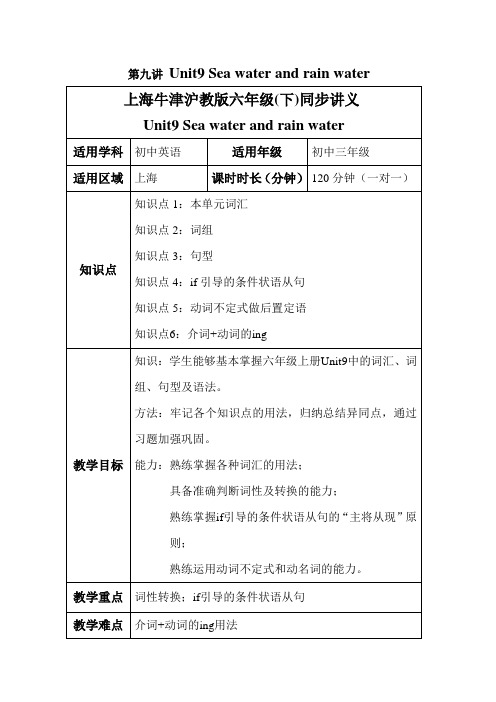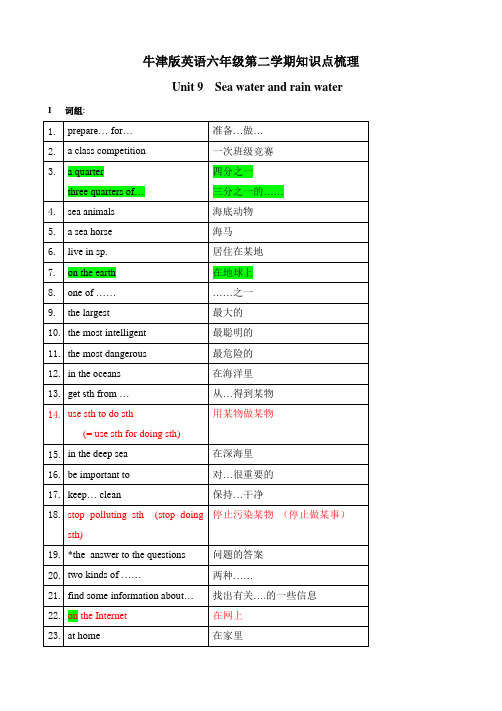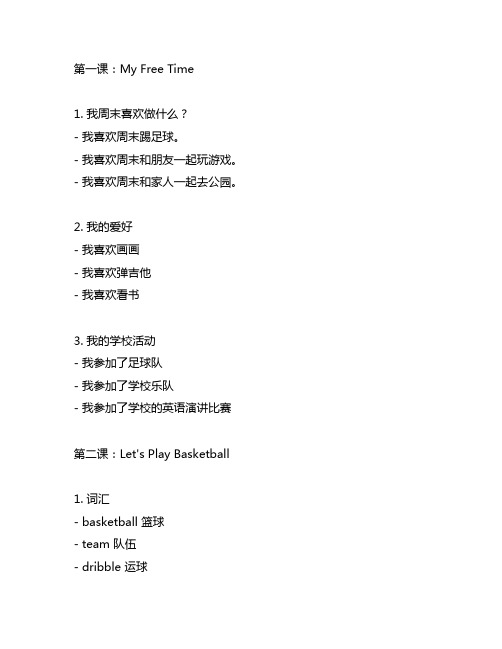U9上海六年级英语笔记 详细版 第九单元
上海6年级第一学期英语6A知识点Unit 9

Unit 9 Picnics are fun1.词性转换: (1) . fun (n) 有趣的事.不可数名词---funny (adj) 有趣的(2) salt (n) 盐----salty (adj)咸的(3) taste (v)尝起来(n)味道(可数名词)---tasty (adj) 美味的= delicious(4) wind (n) 风--- windy (adj) 有风的(5) child (pl) 孩子--- children(6) eat ---ate ---eaten 吃2.(1))plan a picnic ( planning) 计划一次野餐(2))plan sth 计划某件事(3)plan to do sth 计划做某事plan sth 计划某件事3.have a picnic 进行一次野餐4.picnics are fun = It is fun to have picnics. 野餐是有趣的事5.(1)What (great)fun it is !它是多么有趣的事(2)have a lot of fun= have much fun玩得很开心;有很多的乐趣6.spicy sausages 辛辣的香肠7.(1))some cola 一些可乐(不可数名词) (2))a can of cola 一听可乐8.some apple juice 一些苹果汁(不可数名词)9.some fruit 一些水果(不可数名词)10.some meat 一些肉(不可数名词)11.some bread 一些面包(不可数名词)12.some soft drinks 一些软饮料(可数名词)13.some chicken wings 一些鸡翅(可数名词)14.some oranges一些橘子(可数名词)15.some snacks一些点心,小吃( 可数名词)16.Let’s do sth. 让我们做某事17.Let’s have some ---. 让我们吃些18.A(1) Shall we do sth ? 我们做某事好吗?( 提出建议)(2)Let’s do sth, shall we? =(3)What about doing sth ? 做某事怎样?(4) Why not do sth ? / Why don’t we do sth ?(5) Let’s do sth.B: (1)Ok. (2)That’s a good idea. (3) All right . (4) That sounds great.19.提出建议:(1)Shall we buy some……? 我们买些东西好吗?(2 =Let’s buy some ……。
上海牛津沪教版六年级(下)同步讲义unit9

第九讲Unit9 Sea water and rain water教学过程一、课堂导入教师讲述一个与本节课题目有关的英文小故事,引出今日所要讲解的知识点,然后让学生简单梳理一下所涉及的问题,带着问题学习本节课的内容。
二、复习预习教师引导学生复习上节课学的重点内容,检测单词的用法,(以提问、回顾的形式进行),针对上节课的作业进行讲评、订正、答疑,并通过英文小故事导入本节课所要学习的新知识。
三、知识讲解1. 知识点一:重点单词1)competition [ˌkɒmpəˈtɪʃn]【词性】n.【词义】竞争;比赛【易混淆点】competition n. 竞争;比赛compete v. 竞争;比赛【经典例句】Miss Guo is reading a book to prepare a quiz for a class competition about the oceans.郭老师正在读一本书,为一场关于海洋的班级比赛准备一个小测试。
2)intelligent [ɪnˈtelɪdʒənt]【词性】adj.【词义】聪明的;有智慧的【易混淆点】intelligent adj. 聪明的;有智慧的intelligence n. 智力;潜能【经典例句】Dolphins are one of the most intelligent animals.海豚是最聪明的动物之一。
3)important [ɪmˈpɔ:tnt]【词性】adj.【词义】重要的【易混淆点】important adj. 重要的unimportant adj. 不重要的importance n. 重要(性)【经典例句】The oceans are important to all animals on the Earth.海洋对地球上的所有的动物都重要。
4)cover [ˈkʌvə(r)]【词性1】v.【词义1】覆盖;遮掩【词性2】n.【词义2】覆盖物;(书等的)封面【经典例句】What covers almost three quarters of the Earth?什么几乎覆盖了地球的四分之三?5)Internet [ˈɪntənet]【词性】n.【词义】因特网,互联网【易混淆点】Internet n. 因特网website n. 网址web n. 网页【经典例句】Kitty and Alice want to find some information about water on the Internet.Kitty 和Alice想在因特网上找些关于水的信息。
沪教版六年级上册英语Unit9 Great cities of the world知识点习题

Unit 9 Great cities of the world 一、基本知识点(一)词汇:capital [‘kæpɪtl]n. 首都,省会;资金;大写字母;资本家adj. 首都的;重要的;大写的south [saʊθ]n. 南方,南边;南部adv. 在南方,向南方adj. 南的,南方的north [nɔrθ]n. 北,北方adj. 北方的;朝北的adv. 在北方,向北方east [ist]n. 东方;东风;东方国家adj. 东方的;向东的;从东方来的adv. 向东方,在东方west [wɛst]n. 西;西方;西部adj. 西方的;朝西的adv. 在西方;向西方;自西方tourist [‘tʊrɪst]n. 旅行者,观光客adj. 旅游的vt. 在旅行参观vi. 旅游;观光building [‘bɪldɪŋ]n. 建筑;建筑物(二)短语:see a film看电影would like to 想要want to 想要go with 和......一起去run away 逃跑fall asleep 睡着in the forest 在森林里many kinds of 各种各样的on the wall 在墙上at the museum 在博物馆far away from... 距离......远each other 彼此in the east of 在......东部this weekend 这个周末next time 下次once upon a time 从前model car 汽车模型last Saturday 上星期六in the north/south/east/west of 在......北部/南部/东部/西部the capital of … ......的首都by train/plane 乘火车/飞机insect museum 昆虫博物馆car museum 汽车博物馆science museum 科学博物馆how long多长(时间,长度)It takes about...大约花费多长时间make beautiful sounds发出美妙的声音love/enjoy doing sth. 喜欢做某事tall buildings 高大的建筑物in Tokyo 在东京(三)句型:1. 用shall来向对方征求意见的句型Shall we go to school together?Shall we go and see a film this weekend?Shallwehave a party tomorrow?2.询问对方看见了什么的句型及其答语What did you see at school?I/We saw my classmates.What did you see in the park?I/We saw many flowers.What did you see at the museum?I/We saw a lot of interesting things.3. 询问选择某种交通方式从一个地方到另一个地方花费多长时间的句型及其答语How long does it take to get to Beijing from Shanghai by train?How long does it take to get to school from your home on foot?How long does it take to get to China from Japan by ship?It takes about five hours.It takes about twenty minutes.It takes about twenty-four hours.(四) 重难点、易错点:1. How long does it take to travel to Beijing by plane?take:花费;带走by+交通工具2.音标:[ɜ:] [ ə]3.写作:学会如何描写一座城市(位置,特色)二.变式习题基础题(一)词汇首都 ________游客________在...的北部________高大的建筑物________东________西________南________(二)补全单词并翻译汉语1.to_ri_t ( )2.p_nd_( )3.f_ng_rs ( )4.d_nc_r ( )5._uil_ing( )(三)单项选择( ) 1. Snow White is a story _____ a beautiful princess.A. inB. atC. about( ) 2. It’s _____ interesting book.A. aB. anC. /( ) 3. — Did you buy_____ at the museum?— Yes, we did.A. thingB. nothingC. anything( ) 4. _____ is the capital of China?A. BeijingB. ShanghaiC. Tianjin( ) 5. Students usually go to school _____ foot.A. InB. onC. by提高题(一)单项选择( ) 1. What do people love _____ ?A. eatB. eatsC. eatingD. to eat( ) 2. Beijing is in _____ of China.A. eastB. the eastC. westD. the west ( ) 3. You can see a lot of _____ there.A. buildB. buildsC. buildingD. buildings ( ) 4. Do you know how _____ to Shanghai?A. getB. getsC. gotD. to get( ) 5. Beijing is far away _____ Kunming.A. toB. atC. fromD. on(二)按要求完成下列各题1. It is very fast.(变为一般疑问句)___________________________________________________2. I bought a model car.(变为一般疑问句)___________________________________________________3. I have a great time at school.(变为一般过去时)___________________________________________________4. It takes thirty minutes to go there by bike.(对划线部分提问)___________________________________________________5. Hong Kong is in the south of China.(对划线部分提问)___________________________________________________强化题(一)问答句配对()1. How do you get to Hangzhou? A.Yes, it is.()2.Where is Shanghai ? B. I do.()3.Is Big Ben a clock? C. It takes about half an hour.()4. How long does it take? D. I get there by train.()5. Do you like London? E. It is in China..(二)连词成句1.bells,make,the,sounds,beautiful(.)___________________________________________________2.many, find, can, there,you, museums(?)___________________________________________________3.great,a,it,city,is(.)___________________________________________________4.like,too,visiting,they,Great Wall,the(.)___________________________________________________5. tall,can,you,buildings,there,many,see(.)___________________________________________________(三)根据短文内容,选择正确答案San Francisco is a beautiful American city. It lies on the western coastline of the United States. It has lovely views and beautiful scenery. The Golden Gate Bridge, for instance, is a beautiful place to visit. Every day, thousands of people come to visit and enjoy its views.San Francisco is a hilly city.The lovely hills in the middle of the city make it the mostattractive place. Many people walk up and down the hills, and some of the visitors also like to drive on the paths. They can see more places then. There are also visitors who liketo take cable cars. They can get a better view of the city while the cars are moving along the tracks.()1. Where is San Francisco?A.It is in the US.B. It is in the UK.C.It is in Japan.D.It is in China.()2. Which is in San Francisco?A.Big Ben.B.The Palace Museum.C.The Golden Gate Bridge.D.The British Museum.()3. Which is a hilly city?A.Beijing.B.London.C.Shanghai.D.San Francisco.()4. Which of the following is not true?A. San Francisco has lovely views and beautiful scenery.B. Every day, thousands of people come to visit and enjoy its views.C. Many people walk up and down the hills.D. San Francisco lies on the eastern coastline of the United States.。
沪教牛津版六年级英语下(Unit9 基础知识梳理)

精锐教育学科教师辅导讲义6. internet n.因特网e. g. -The Internet has made the world smaller.因特网使世界变小了。
-That's because it has made communication faster.那是因为它使交流变快了。
7. shower v.淋浴n. 淋浴; 淋浴装置e. g. People use water for showering.人们用水来淋浴。
【提示】shower作动词时,相当于have showers。
8. farmer n.农场主,农民e. g. These days many farmers come to work in cities.现在许多农民进城工作。
9. crop n.庄稼e. g. The main crop in China is rice.中国的主要作物是水稻。
10.dripping adj.滴水的,湿淋淋的e. g. It's dripping day today.今天是个下雨天。
Is that roof still dripping? 那个屋顶还漏雨吗?He was dripping blood onto the floor.他的血正滴到地板上。
I'm dripping wet.我浑身湿透了。
11.waste v.浪费e. g. Eat up your rice. It’s bad to waste food.把米饭吃光,浪费粮食不好。
12. fix v.修理e. g. I asked the boy to fix the bicycle.我请这个小伙子修理自行车。
【知识拓展】repair v.修理Ⅱ. Daily expressions. 日常表达1. turn…off 把……关上(龙头,电器等)e. g. Please turn the water tap after you wash hands.洗完手后请关上水龙头。
2023年沪教牛津版六年级英语上册Unit 9 Great cities of the world

2. It’s in the north of China. 它在中国的北部。
在本句中 in 是方位介词,意为“在……内 ,在……里 面”,表示在该范围以内。 例句:广州在中国的南部。
Guangzhou is in the south of China.
拓展:on, to 表示方位的用法
(1)on表示与某地的接壤关系。 例句:朝鲜在中国的东面。 Korea is on the east of China.
or → work word
er → teacher driver
a → sofa again
paper waiter umbrella along
Listen and circle.
1 work 2 bird 3 purple 4 word 5 third 6 girl 7 term
worker banana paper waiter salad again teacher
—It takes about five hours. 大约花费五个小时。 询问选择某种交通方式从一个地方到另一个地方花
费多长时间的句型:How long does it take to get to + 地 点 + from+地点 + 交通方式 ?
答语结构:It takes about + 时间. 例句:从这儿到飞机场要多长时间? 大约要两个小时。 How long does it take to get to the airport from here? It takes about two hours.
Quiz card 3 1 _W__h_e_r_e_i_s_L__o_n_d_o_n_?______________ 2 _W__h_a_t_c_a_n__t_o_u_r_is_t_s_fi_n_d__in__L_o_n_d_o_n__? 3 _W__h_a_t_d_o__p_e_o_p_l_e_i_n_L__o_n_d_o_n_l_o_v_e_e_a_t_in__g_?
牛津版上海版六年级下册Unit9Seawaterandrainwater

Unit 9 Sea water and rain water一、单元分析(Unit Analysis)(一)单元地位(Unit Position)16B 中已显现了use water to do sth.,本单元介绍了此句型的另为一种表达方式:use water for doing sth.,教师能够从use…to do.. 引出use … for doing用法。
教师让学生用身旁的例子和生活体会,导入此句型。
,鼓舞用此句型进行操练。
2本单元显现了if…will…的复合句,要增强操练。
学生对复合句的用法不很熟练,应设计各类情景,强化此句型的操练,以达到熟练运用。
3新的句型:we can save water by doing sth.学生在同意时会碰到困难,应该多加以机械操练。
4祈使句已经在前两册中显现过,本单元继续增强。
Fixing dripping taps. Turn dripping taps off.5Have you ever seen…? 的句型在6A中已显现,但作为知识难点,教师在学习进程中还要再复现与强调。
6作为情感态度进展的目标,教师要对学生进行节约能源的教育。
(二)单元目标(Unit Target)1熟练把握use sth. for doing sth. / We use water for showering. / We use water for cooking.2If… will…复合句的把握,结合阅读的材料进行操练。
3把握句型:How can we use water?We can use water by doing sth.4介词for 的用法(后跟一段时刻); 介词by, under的用法5重点把握情态动词can表达建议的用法。
(三)单元重点(Unit Points)1 关键词:⑴关于海洋生物的介绍:a coral reef, seaweed, dolphin, shark, intelligent.⑵关于如何节约用水:fix a dripping tap, turn a runni ng tap off, take a shower2 功能:用what/why/where/when/who/how…?询问对方,获取信息。
上海市牛津版英语6Bunit9知识点总结梳理

牛津版英语六年级第二学期知识点梳理Unit 9 Sea water and rain waterI词组:II. 词性转换:III. 语言点/句型A. 语言点:1. quartera quarter of 四分之一的….. three quarters of 四分之三的…a half of 二分之一的….e.g. Almost three quarters of the land is polluted.1/2: one – second / a (one) half1/4: one- fourth / a quarter3/4: three – fourths / three quarters2. one of…one of + 形容词的最高级+ 名词复数:“最….之一”one of + 名词复数:“…之一”e.g., Jinmao Tower is one of the tallest bridges in the world.3.keepkeep sth. + adj. “使……处于某种状态”e.g., We promise to keep the beaches clean.Would you please keep the class quiet?Would you please keep the window open?4. stopstop doing sth 停止做某事e.g., We must stop killing wild animals.* stop to do sth 停下来开始做某事e.g., When the bell rang, the students stopped to have a rest.5. have no + 名词e.g., We will have no time at all to write to you.= We will not have any time at all to write to you.He has no money.= He doesn’t have any money.6. needneed sth/ sb to do sth“需要某物/某人来做某事”e.g., If I need you to come and help, I’ll call.We need a hammer to fix the desk.7. waterwater (n.) 水(不可数名词)water (v.) 浇灌e.g., Don’t forget to water the flowers in the garden.8.wastewaste (v.) 浪费waste (n.) 浪费;废弃物e.g., Don’t waste the flour; there isn’t much.It’s a waste to throw away good food.9.turn offturn off 关掉turn on 打开e.g., Please turn off the radio.= Please turn the radio off.注意:当我们使用代词(it / them等)代替名词时,必须使用turn it/them offe.g., Please turn it off.10.instead ofa)instead of为介词短语,后面一般加名词、代词、动名词(-ing)等e.g., I have come instead of my brother.I will go instead of you.He was studying the whole afternoon instead of playing football.* b) instead 为副词,e.g., Mr. Wang was ill. Instead, Mr. Li gave us the lesson.B.句型:*1. 形容词最高级的用法1)形容词最高级的构成规则变化:①单音节形容词和少数双音节形容词的最高级构成:a)一般在词尾加-este.g., tall --- tallest bright --- brighterb)重读闭音节结尾且词尾只有一个辅音的形容词,双写最后字母,再加-este.g., big --- biggest fat --- fattest thin --- thinnestc)“辅音+y”结尾的形容词,将y改为i,再加este.g., heavy --- heaviest early --- earliest easy --- easiest②多音节形容词和部分双音节形容词的最高级构成:在形容词前,加moste.g., beautiful --- most beautiful intelligent --- most intelligent③不规则变化:e.g., good --- best bad --- worstmany / much --- most little --- least2)基本用法:①用于三者或三者以上的人或事物之间的比较,表示在一些人或事物中,其中一个“最……”②形容词最高级的前面一般要用定冠词the,即“the +形容词最高级”③形容词最高级+ of + 比较对象形容词最高级+ in + 比较范围e.g., She is the best student in our class.He is the most diligent of the three boys.④one of + 形容词的最高级+ 名词复数:“最….之一”e.g., Harry Potter is one of the most interesting books in the world.⑤* 最高级与比较级的转换:最高级=比较级+any other +名词单数+ thane.g., Whales are the largest animals in the world.= Whales are larger than any other animal in the world.Tony is the tallest in our class.= Tony is taller than any other student in our class.2.if 引导的条件状语从句①if表示如果,用以引导条件状语从句②在条件状语从句中,如果主句用一般将来时,if从句相应的使用一般现在时,称为“主将从现”③If从句可放在主句前面,亦可放在主句后面。
六年级英语上册第9单元课堂笔记

第一课:My Free Time1. 我周末喜欢做什么?- 我喜欢周末踢足球。
- 我喜欢周末和朋友一起玩游戏。
- 我喜欢周末和家人一起去公园。
2. 我的爱好- 我喜欢画画- 我喜欢弹吉他- 我喜欢看书3. 我的学校活动- 我参加了足球队- 我参加了学校乐队- 我参加了学校的英语演讲比赛第二课:Let's Play Basketball1. 词汇- basketball 篮球- team 队伍- dribble 运球- shoot 投篮- rebound 篮板球2. 动词短语- play basketball 打篮球- practice dribbling 练习运球- shoot hoops 投篮- pass the ball 传球3. 句型- We play basketball every Sunday. 每个星期天我们打篮球。
- My brother and I always practice dribbling together. 我和我哥哥总是一起练习运球。
- Can you shoot hoops? 你会投篮吗?第三课:Weekend Activities1. 我的周末活动- 星期六早上,我和家人一起去逛公园。
- 星期六下午,我会去上足球课。
- 星期天早上,我和朋友们会一起打篮球。
- 星期天下午,我会在家看书学习。
2. 我的外公外婆的周末活动- 我的外公外婆喜欢去晨练。
- 他们还会一起去公园散步。
- 在家的时候,他们会一起做饭。
3. 我的家庭周末活动- 我和家人会一起做家务。
- 我们也会一起去超市购物。
- 有时候,我们会一起去看电影或者去游乐园。
第四课:My Favorite Sport1. 我最喜欢的运动- 我最喜欢踢足球。
- 我觉得踢足球很有趣。
- 我也喜欢看足球比赛。
2. 我的家庭成员喜欢的运动- 我爸爸最喜欢打篮球。
- 我妈妈最喜欢慢跑。
- 我的妹妹最喜欢跳绳。
3. 我的朋友喜欢的运动- 我的朋友小明最喜欢游泳。
- 1、下载文档前请自行甄别文档内容的完整性,平台不提供额外的编辑、内容补充、找答案等附加服务。
- 2、"仅部分预览"的文档,不可在线预览部分如存在完整性等问题,可反馈申请退款(可完整预览的文档不适用该条件!)。
- 3、如文档侵犯您的权益,请联系客服反馈,我们会尽快为您处理(人工客服工作时间:9:00-18:30)。
U9 Picnics are fun
1.Picnic (n.) 野餐
= picnics pl)
=picnic (v) = picnicking
P: have a picnic
Go on a picnic
Go picnicking
2.Fun (un) 乐趣
Eg: (1) what great fun it is to go swimming in summer!
(2) That sounds interesting.
That sounds like a lot of fun/ great fun.
Funny (adj.) 好笑的,滑稽的
Funny-funnier-funniest
Eg: (1). He Shenyi is one of the funniest persons I have ever seen.
(2). My grandfather always tells me some funny stories.
P: make fun of
Eg: (1). April fool’s Day is the time for for people to make fun of others.
P: have fun doing sth. 做某事有乐趣
Eg: (1) We sometimes have fun playing basketball together.
3.Stop sb. from doing 阻止某人做……
Eg: They stop people from polluting the environment.
4.Jam (un) 果酱
Eg: Bread tastes nice with jam.
(cn) 拥挤
Eg: (1) I was delayed by the traffic jam on my way home.
(2) There are always heavy traffic jams on my way to school.
5. A packet of nuts
A bottle of water
A bowl of rice
A bar of chocolate
A slice of meat
A loaf of bread
A clove of garlic
A piece of paper/furniture
A tin/can of cola
A cup of tea/coffee
6.Sweet----sweeter-----sweetest sweet(cn) 糖果
Sour-----sourer------sourest
Bitter-----bitterer------bitterest
Spicy-----spicier-----spiciest
Salty-----saltier------saltiest salt(un)盐suger(un)糖
7.Chilly (cn) 辣椒= chilies
8.Taste(v.)+adj.
Eg: (1) The apple tastes nice.
(n.) 尝一下
Eg: (1) Please have a taste of the cake.
Tasty (adj.) 美味的
==tastier—tastiest
9.Plan (n.) 计划
P:make a plan (v.)计划
Plan—planned—planned—planning
P: plan to do sth.
10.Be busy doing sth.
Eg: (1) My mother was busy cleaning the house when I reached home.
11.Spread—spread—spread—spreading
Eg: (1) Let’s buy some jam to spread on the bread.
涂,抹
(2)He is spreading a slice of bread with butter.
传播,蔓延
(3)The good news spread fast in the town.
(4) The floods spread from one village to another.
12.The old man died two years ago.
=== The old man has died.
===The old man has been dead for two years.
Die—be dead
Borrow—keep
Buy—have
Begin—be on
Go/come----be in/at
Join---- be a member of…
(1)现在/过去完成时
(2)一段时间瞬间动词=持续动词
Eg: (1) How long have you kept the book?
For three weeks.
(2) I have had the dictionary for ten years.
13.A piece of music
14.Must be 一定是I’m sure
Can’t be 一定不是
Can be 可能是
May be 可能是
I’m afraid… , I’m not sure
Eg: (1) I saw Peter a minute ago, so he can’t be at home.
(2) You look pale ( 苍白的), you must be ill.
(3) Joe is absent( 缺席的) today, he may ill, I’m not sure.
15.Spit-spit- spit-spitting 吐痰
16.Hold (v.)-held-held-holding
(1)举办
(2)We will hold a meeting tomorrow.
= A meeting will be held tomorrow.
Eg: (1) A new hospital will be built in our city.
(2) Thousands of trees will be planted next year.
(3) They’ll be invited to attend the meeting.
(4) The classroom will be cleaned by He shenyi tomorrow.
(2) 容纳
Eg: This classroom can hold 50 persons.
17. need-necessary (adj.) 有必要的
Necessity (n.)必要性,必需品
Eg: (1) Water is a basic necessity of life.
(2) It’s necessary for us to read books regularly.
18. How much is/are sth.?
= How much does/do sth. cost?
=What’s the price of sth.?
19, prepare (v.) 准备
Prepare-prepared-prepared-preparing
Prepared(adj.) 准备好的be prepared to do…
Preparation (n.) 准备
P:prepare sth. for…
Prepare for…= make preparations for = get ready for Prepare to do
Eg: (1) They prepare a big meal for the guests.
(2) They have prepared for the birthday party.
= They have made preparations for the birthday party, = They have got ready for the birthday party.
(3) I am prepared to stay up late.
(4)They are making preparations for the final exam.
20. like (v.)-----dislike
Like(prep.)----unlike
Eg: (1) He dislikes playing football, doesn’t he?
否定词:few, little, never, hardly, seldom, rarely,
Not, neither, none
21. shopping (n.) list
Shopping center (n.) 中心(adj.)century
Shopping mall
Shopping basket
22. much too +adj./adv.
Too much + (un)
Too many +(cn)
23. may I … ok
Could I…. sure
Can I…. of course
Certainly
Sorry
24. Would like some…? Yes, please.
No, thanks.。
